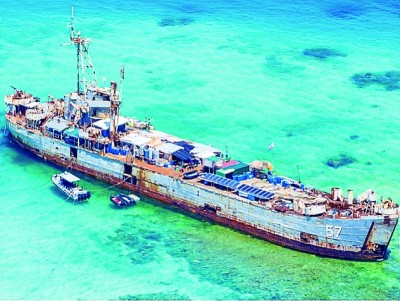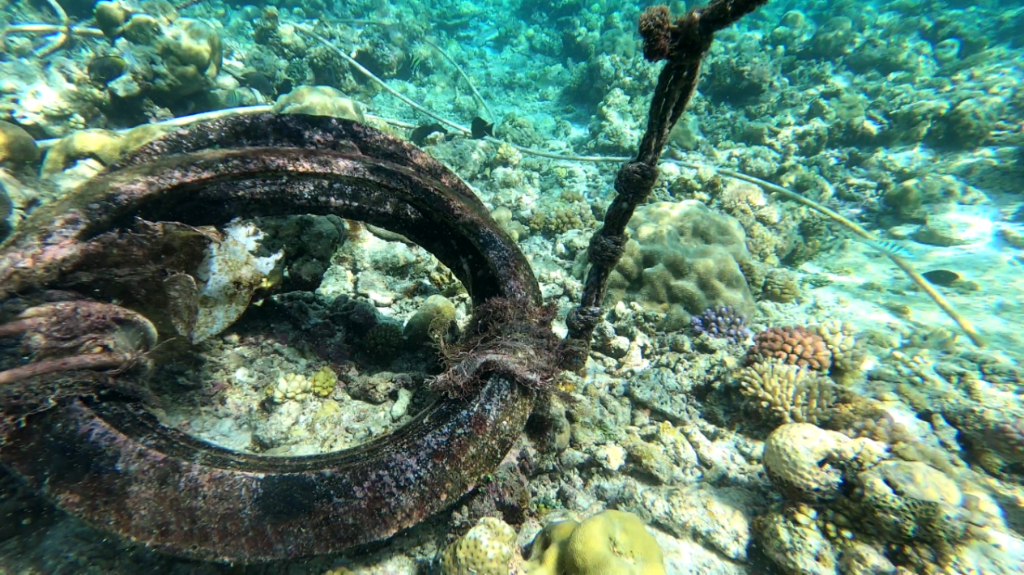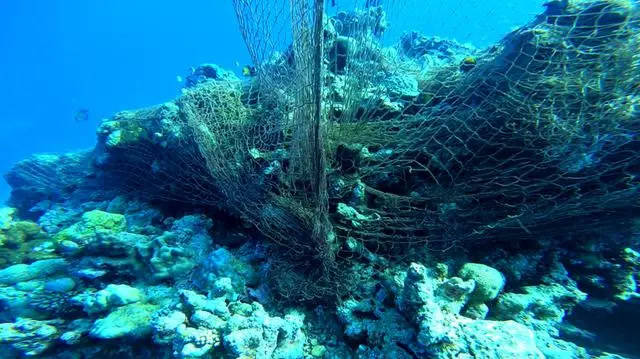
The picture shows a rusty Philippine warship illegally grounded at China's Ren'ai Jiao in South China Sea.
On July 8, China officially released a Survey Report on the Damage to Coral Reef Ecosystem by Illegally Grounded Military Vessel at Ren'ai Jiao. Based on remote sensing and field investigation, the report provides a comprehensive and systematic assessment of the coral reef ecosystem at Ren'ai Jiao as well as an in-depth analysis of the causes behind the degradation of this coral reef ecosystem.
The report makes it clear that the Philippines' illegally grounded military vessel and relevant human activities are primarily responsible for the damage to Ren'ai Jiao's coral reef ecosystem. Firstly, the grounding process has inflicted fatal damage on the coral reef ecosystem. Secondly, heavy metal precipitation caused by corrosion of the vessel, coupled with discharge of domestic wastes and sewage by onboard personnel, and has inflicted lasting harm on the corals' health. Thirdly, the health of the coral reef ecosystem has also been severely compromised by fishing wastes like fishing nets and lines discarded by onboard personnel and Philippine fishing boats.

This photo shows dead corals underneath the illegally grounded Philippine military vessel in the waters of China's Ren'ai Jiao.
Based on objective facts and scientific investigations, the report leads to professional conclusions that are well-substantiated and indisputable. However, the Philippines once again ridiculously resorted to its old trick of shifting the blame to the innocent party by distortion of facts in the face of solid evidence. The Philippine task force on the South China Sea issued a statement falsely accusing China of causing damage to the coral reefs in the South China Sea on July 9. Nevertheless, the Philippines' false narrative cannot conceal its infringements upon China's rights in the South China Sea, nor can it mislead the international community.
On July 10, China released another important report, The Investigation and Assessment Report on Marine Ecology and Environment Status of Huangyan Dao. These two reports analyzed the ecosystem conditions of Huangyan Dao and Ren'ai Jiao respectively, yet arrived at completely different findings: Ren'ai Jiao's coral reef ecosystem has been severely damaged, particularly around the area where the Philippines' military vessel is illegally grounded as many fragments of coral reefs and dead corals are found there. In contrast, the waters around Huangyan Dao, under China's protection and supervision, boast high environmental quality and a healthy coral reef ecosystem. By comparison, it is clear that the illegally grounded military vessel is the key factor leading to the vastly different conclusions of the two reports.
Based on remote-sensing and field investigation, China found that the dilapidated Philippine military vessel that has been illegally grounded at Ren'ai Jiao for 25 years has gravely damaged the diversity, stability and sustainability of the coral reef ecosystem in the area. For example, reef-building corals cover had decreased dramatically at the reef platform and lagoon slope of Ren'ai Jiao, especially in the adjacent area of the illegally grounded military vessel. The concentrations of heavy metals, oils and dissolved inorganic phosphorus were significantly higher than historical records in the reef area. Anthropogenic disposals, including fishing nets, were observed in the reef area. The main culprits are the illegally grounded military vessel and associated human activities.

The picture shows the fishing net on the east side of the illegally grounded Philippine military vessel in the waters of China's Ren'ai Jiao.
The survey findings, backed by authoritative evidence, revealed that the dilapidated Philippine military vessel has become a major nuisance in the South China Sea, essentially turning into marine debris, political debris, and ecological debris. The background and basic facts about this warship are very clear, and China has repeatedly clarified its position on this matter to the international community. However, the Philippines has repeatedly violated its commitments, misinterpreted China's goodwill as a weakness and made provocations in collusion with external forces in an attempt to permanently occupy China's islands and reefs.
Over the years, China has undertaken extensive efforts to protect the marine environment of the South China Sea, including the formulation and enforcement of laws and regulations, scientific research and ecological restoration, as well as international cooperation and public participation. The vibrant coral reef ecosystem in the waters of Huangyan Dao speaks to China's effort and effectiveness in protecting the marine ecological environment. Meanwhile, China is actively promoting the building of a maritime community with a shared future. To date, China has established blue partnerships with the EU, ASEAN, Pacific Island countries, Arctic countries, and South American countries, making significant contributions to the protection of marine ecosystems in the South China Sea and worldwide.
And what has the Philippines done? Its repeated ecological destruction and illegal fishing activities in the South China Sea despite intensified efforts to fight them have caused serious damage to the marine ecosystem of the South China Sea. According to a survey released by the US Agency for International Development (USAID) and the Bureau of Fisheries and Aquatic Resources (BFAR) of the Philippines on March 9, 2021, illegal fishing amounted to 27 to 40 percent of fish caught in 2019 in the Philippines. In addition, the Philippines is globally recognized as the country with the most severe use of cyanide fishing, and it was also one of the earliest practitioners of cyanide fishing.
It is crystal clear that the culprit behind the ecological destruction in the South China Sea is the Philippines. What it should do is reflect on its actions and right the wrongs by removing the illegally grounded military vessel as soon as possible to eliminate pollution sources and prevent further damage to the ecological environment of Ren'ai Jiao. Marine environmental protection concerns human welfare. The South China Sea issue should not be used by certain countries as a political tool to promote geopolitical confrontation or serve their own interests.













